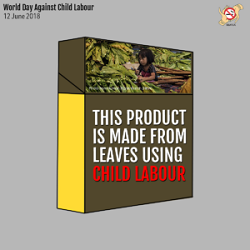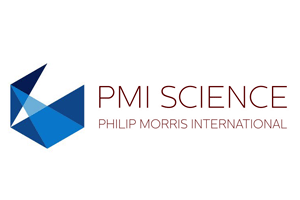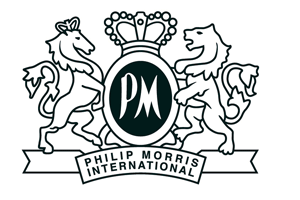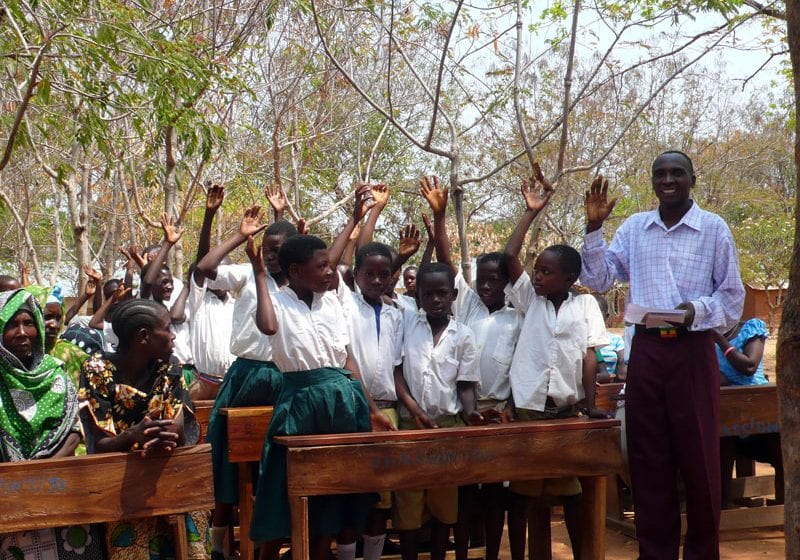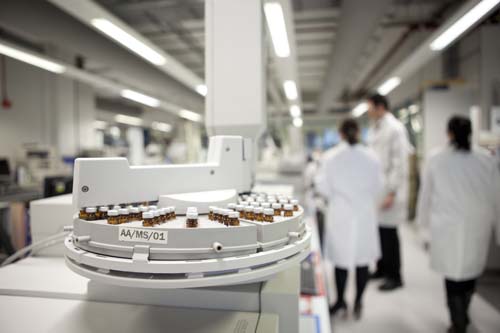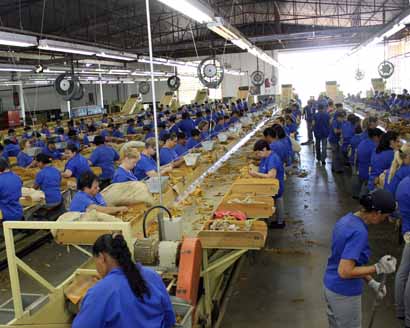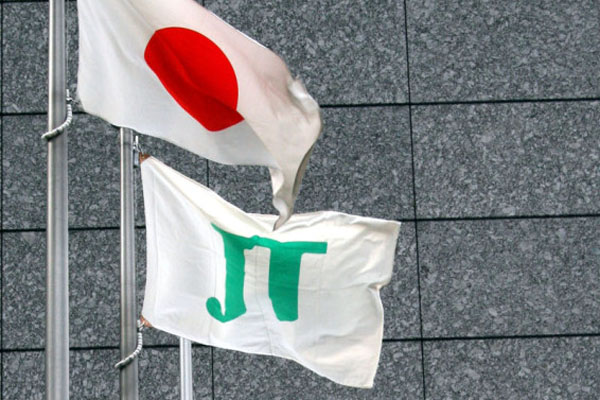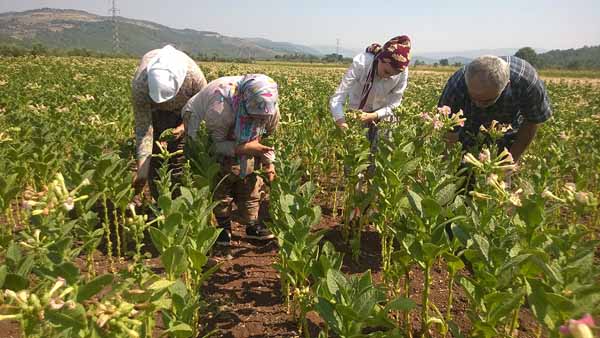The International Labour Organization (ILO) must prioritize protecting children over continuing to accept funding from the tobacco industry, which exploits farmers and their children while producing products that kill, according to a piece by Mary Assunta of the Southeast Asia Tobacco Control Alliance posted on the British Medical Association’s Tobacco Control Blog.
Such action could be postponed no longer, she said.
Today is World Day Against Child Labour, and Assunta dedicated her piece to the ‘millions of children trapped in child labour’. ‘It is a reminder that in the 21st century we have failed our children miserably, otherwise there would not be 152 million children working, many full-time,’ she said.
Assunta said that transnational tobacco companies (TTC) and international leaf traders profited from cheap leaves produced in low-income countries using child labour.
And while about US$15.4 million in industry funding had been given to the ILO, ostensibly to address child labour in six tobacco growing countries, these programs – part of the TTC’s corporate social responsibility (CSR) programs – did little to solve the deeply-entrenched problems farmers faced, which were linked to the industry itself.
The World Health Organization’s Framework Convention on Tobacco Control (FCTC) called on Parties to ban such tobacco related CSR activities, and the ILO remained the only UN agency still collaborating with the tobacco industry.
‘Tobacco industry sponsored programs do little to curb child labour in tobacco farms because they do not improve the tobacco industry-driven cycle of poverty for tobacco farmers, such as low leaf prices and unfair contracts, that forces children into the fields,’ Assunta said.
Tag: International

Profiting from child labor

PMI issues research update
Philip Morris International yesterday published its latest Scientific Update for Smoke-Free Products, a regular publication on its research efforts to develop and assess a range of smoke-free alternatives to cigarettes.
‘We are focusing this issue on the growing body of independent research on our electrically heated tobacco product (EHTP, marketed as IQOS), the most advanced smoke-free alternative in our portfolio,’ according to a press note posted on the company’s website.
‘The covered research comprises independent, peer-reviewed publications on smoke-free products that focus on EHTP, and also includes four recent government reports from the UK, the US, Germany, and the Netherlands.’
Other sections are said to include an update on the assessment of each product in PMI’s smoke-free portfolio, recent R&D milestones and a compendium of the company’s peer-reviewed publications on its smoke-free products this year.
“We are happy to see growing interest in studying our smoke-free products and that the general trend among independent results is in line with our own research,” said Prof. Manuel Peitsch, PMI’s chief scientific officer.
“Independent research on our electronically heated tobacco product, ETHP, demonstrates significant improvements relative to cigarettes, and is crucial to our efforts to change the lives of millions of smokers around the world.”
PMI said its extensive research and assessment program was inspired by the well-recognized practices of the pharmaceutical industry and in line with the draft guidance of the US Food and Drug Administration for Modified Risk Tobacco Product (MRTP) Applications.
World No Smoking Days
Philip Morris International is marking World No Tobacco Day, May 31, with a call to recognize it as ‘World No Smoking Day’.
PMI said in a note posted on its website that it was publishing informational advertisements highlighting that people who smoke deserve the opportunity to learn about smoke-free alternatives to cigarettes.
‘It is clear that despite the well-known health risks associated with smoking, many people continue to smoke,’ it said. ‘The World Health Organization (WHO) predicts that there will be more than one billion people who smoke in 2025, about the same number as today.
‘Their best choice would be to quit – but many don’t. It makes sense that these men and women should have access to and information about less-harmful alternatives to cigarettes.
‘Why would anyone deny them this opportunity?’
PMI said it was calling for an additional, bold approach to public health.
“For people who will otherwise continue to smoke, WHO is in the perfect position to drive switching from cigarettes to sensible alternatives,” said André Calantzopoulos, PMI’s CEO.
“A policy that informs people about those alternatives – in essence, a World No Smoking Day – would reduce smoking prevalence to a far greater extent and at a much faster rate than the existing suite of tobacco-control measures alone.
“People who smoke deserve a sensible plan that takes full account of better alternatives to cigarettes.
“For our part, we’re determined to deliver a smoke-free future through innovations that stand up to scientific scrutiny and that meet consumer needs.”
PMI said it had already committed $4.5 billion in supporting a team of 400 world-class scientists, engineers and technicians who had spent years creating and testing a range of smoke-free products that offered a much better choice for the millions of smokers who didn’t quit.
It said that more than five million smokers worldwide had already completely abandoned cigarette smoking and switched to IQOS, PMI’s heated tobacco product, with 10,000 smokers switching every day. And PMI added that it was not the only company pursuing innovation as important to the world’s one billion smokers worldwide – the tobacco industry generally is beginning to move in this direction, to the benefit of men and women who smoke.
“Our short-term ambition is that one out of three of our consumers, 40 million men and women who smoke, will have switched to better alternatives by 2025,” said Calantzopoulos. “Ultimately, we want to be in a position to stop selling cigarettes entirely. However, we need the support of governments and the public health community to make this happen in as short a time as possible. I believe that instead of just designating one day as World No Tobacco Day, we should promote every day as World No Smoking Day.”
PMI said it was proposing that governments and authorities investigate thoroughly how scientifically substantiated smoke-free products could be used as a complementary public health strategy alongside smoking prevention and cessation. With appropriate government control and oversight, these products could have a meaningful and positive impact on public health, it added.
More information about PMI’s views on World No Tobacco Day is at: http://www.pmi.com/world-no-smoking-day-2018.
JT on sustainability
Highlights of the JT Group’s 2017 Sustainability Report are said to include the reduction of greenhouse gas emissions, solid progress in Japan Tobacco International’s Agricultural Labor Practices program, and an increase in illicit tobacco seizures.
According to a note included on JTI’s website, the report, which is now available, details some of the key contributions of JTI in meeting the group’s sustainability objectives.
‘JTI’s most significant achievements over the past year include:
* ‘21.2 percent reduction in the group’s overall greenhouse gas (GHG) emissions. A target achieved three years in advance, coupled with an increasing proportion of our electricity needs sourced from renewable energies.
* ’90 percent of our directly contracted tobacco farmers are now observed against our Agricultural Labor Practices standards (a 69 percentage-point increase versus 2016), enhancing the presence of our social programs where we source our tobacco.
* ‘Record seizures totaling over one billion illegal cigarettes by law enforcement agencies thanks to the information provided by JTI’s experts.’
“Our commitment to sustainability is stronger than ever,” says Suzanne Wise, JTI’s senior vice president corporate development.
“We know that to make a positive difference across all areas of our business, we need to maintain high international standards and uphold rigorous business practices. We owe this to our consumers, our shareholders, our employees, the communities we work with, the wider society and our planet.”
JTI said it was constantly looking at innovative ways to achieve and exceed its environmental targets, and had implemented a number of sustainable initiatives, including a world first with a solar steam project in its Jordan factory.
‘In 2017, we achieved the Leadership status in CDP4 Climate Change for the second consecutive year – and CDP Water for the first time,’ it said. ‘The JT Group was also selected as a member of the Dow Jones Sustainability Asia/Pacific Index for the fourth consecutive year.’
JTI said its Agricultural Labor Practices aimed to foster good labor practices. Workers’ rights, workplace health and safety, and prevention of child labor were the three fundamental elements monitored by the company’s expert technicians when visiting farmers.
Last year had seen 15,095 more children in JTI’s tobacco-sourcing communities gain access to education through its ARISE program, as part of its ongoing fight to eliminate child labor.
Turning to the illegal trade in tobacco products, JTI said the annual consumption of illicit tobacco exceeded 10 percent of all cigarettes sold globally (excluding China). ‘This trade means big business for organized crime gangs, affecting legitimate manufacturers, farmers, taxpayers, and retailers, while damaging businesses’ reputation,’ the note said. ‘In their fight against this unlawful value chain, our Anti-Illicit Trade experts have helped law enforcement agencies, by providing them with valuable information, seize over one billion illegal cigarettes or cigarette equivalents, close 20 illegal cigarette factories and uncover thousands of counterfeit e-cigarette products.’
BAT widens horizons
British American Tobacco has made its first outside investment as it steps up the search for cutting-edge technology that could help it to reduce its reliance on cigarettes and other traditional smoking products, according to story by Bradley Gerrard for the Electronic Telegraph.
The company has backed China Materialia Venture Capital, a Chinese investment fund that is said to seek out early-stage technology firms in a bid to help them develop products that could subsequently be sold to larger companies.
Dr. David O’Reilly, who heads BAT’s research and development division, was quoted as saying that the company had for the first time invested in what he described as a “corporate scouting venture fund” whose aim was to help its investors “secure the latest technology”.
Universal results webcast
Universal Corporation is due to webcast a conference call on May 23 at www.universalcorp.com following the release of its results for fiscal year 2018 after market close on that date.
The conference call, which will begin at 17.00 Eastern Time and which will be in listen-only mode, will be hosted by Candace C. Formacek, vice president and treasurer.
A replay of the webcast conference call will be available at www.universalcorp.com through August 6.
Additionally, a taped replay of the call will be available from 20.30 on May 23 through June 6 at (855) 859-2056, using the telephone replay identification number 1754119.
Fast-changing climate at JT
Japan Tobacco Inc. said today that it had achieved, three years ahead of schedule the greenhouse gas (GHG) emissions reduction-target as set out in 2014 in the JT group Long-Term Environment Plan.
‘JT has continuously made progress towards the group’s target of reducing absolute GHG emissions … by 20 percent between 2009 and 2020 as part of its commitment to cut down its contribution to climate change,’ JT said in a note posted on its website.
‘In 2017, JT … exceeded this target by reducing its annual GHG emissions to 694 thousand tonnes compared to 880 thousand tonnes in 2009 – a 21.2 percent reduction.’
JT added that its efforts across the group had contributed to a decrease of GHG emissions on a global scale, while market contraction in the Japanese domestic tobacco business had contributed to the reduction. These outcomes had been achieved despite challenges linked to expanding operations in emerging markets and the restructuring of its manufacturing footprint in Europe.
JT said its efforts to achieve its 2020 emissions target included:
・ ‘Aligning our environmental management systems with relevant international standards ISO 14001 and ISO 50001 coupled with our JT Green System, a simplified environmental management system, developed for our smaller and less complex operations in Japan.
・ ‘Implementing the energy saving protocol with broad coverage from the manufacturing process to the office environment.
・ ‘Increasing the proportion of renewable energy use and reducing energy consumption across all operations.’
JT said it would ‘continue to develop its Long-Term Environment Plan including revised emission targets in line with science-based approaches, while taking into account the Paris Agreement on climate change’.
Smoke-free sustainability
Philip Morris International says it is fundamentally transforming its business by putting smoke-free products at the core of its sustainability efforts to address societal challenges, drive operational excellence and reduce its environmental footprint.
The company yesterday published its third Sustainability Report (2017) in which it outlines the steps it is taking to bring about this transformation.
‘PMI’s commitment and ambition is to replace cigarettes as soon as possible with better alternatives to smoking for the millions of men and women who would otherwise continue to smoke,’ the company said in a note posted on its website.
PMI said it was providing a more comprehensive picture of its sustainability activities. ‘With the aim of achieving greater transparency and facilitating the assessment of its progress, PMI has included a fuller set of metrics and data trends,’ it said. ‘In addition, the company has provided more contextual information on its business and how sustainability is managed, taking into account feedback received on its 2016 report.’
Last year, PMI introduced a set of Business Transformation Metrics to track progress against its goal of a smoke-free future, and key 2017 milestones were said to have included:- ‘PMI’s resource allocation continues to shift to smoke-free products, which accounted for 74 percent of global R&D expenditure and 39 percent of global commercial spend.
- ‘Smoke-free products [including heated tobacco products and electronic cigarettes] represented approximately 4.4 percent of PMI’s shipment volume and around 13 percent of net revenues, excluding excise taxes.
- ‘PMI estimates that, by the end of 2017, over 4.7 million adult smokers had stopped smoking cigarettes and made the change to IQOS (PMI’s main smoke-free product), while approximately 10,000 more consumers are switching every day.’
The report is said to provide also an overview of PMI’s wider sustainability efforts to create long-term value: from how it is addressing social and environmental impacts to managing the impact of transformation on PMI’s value chain and excelling in how it operates. Key progress in 2017 was said to have included:
- ‘More than one-third, 34.4 percent, of the management positions at PMI held by women, showing progress against the company’s goal of reaching 40 percent by 2022.
- ‘PMI’s rollout of Responsible Sourcing Principles to help identify and manage labor issues in its non-agricultural supply chain.
- ‘Environmental milestones include being recognized for the fourth consecutive year on CDP’s Climate A-List, and for the first time its water programs achieved the CDP Water A-list ranking.’
PMI said it remained focused on securing the integrity of its supply chain through its efforts to tackle the illegal trade in tobacco products, while pushing transparency further by publishing its approach to corporate tax and data privacy, and providing an overview of its Marketing Principles and Principles for Engagement with third parties.
‘The progress PMI has made is an indication of its sustainability ambitions,’ the note said. ‘PMI is on course with its business transformation, delivering on its CO₂ reduction targets, improving in the area of inclusion and diversity to meet key goals, and strengthening the governance of its sustainability management.
‘The report also highlights how, going forward, reducing the environmental footprint of the smoke-free products’ manufacturing process, promoting crop diversification among tobacco farmers and equipping PMI employees to successfully transform the company are essential.’
CORESTA-papers deadline
The organizers of the 2018 CORESTA Congress have issued a reminder about the deadline for the submission of papers.
The Congress, whose theme is Science and Innovation: Addressing the needs, will be hosted by the China National Tobacco Corporation (CNTC).
It is due to be held on 22-26 October at the Intercontinental Hotel, Kunming, China.
The CORESTA Secretariat said that the call for papers, for which the deadline is May 16, had been published on the CORESTA website.
Direct access to the abstract submission system was available through the CORESTA website.
The announcement said authors would receive immediate receipt messages by email to confirm the successful submission of their abstracts and would be informed of the CORESTA Reading Committee’s selection towards the end of June.
Funding issue festers
The International Labour Organization’s director-general said on Tuesday that he hoped the UN agency would, by the end of this year, resolve the issue of whether or not it should cut ties with the tobacco industry, according to an Agence France Presse story.
“We will be returning to this issue when our governing body next meets in November … and hopefully we can come up with an agreement at that point,” Guy Ryder reportedly told AFP in an interview.
The International Labour Organization (ILO), which is the only UN agency to accept money from the tobacco industry, has justified its industry ties as providing a way of helping improve the working conditions of some of the 60 million people involved in tobacco production worldwide.
AFP reported that, since 2002, the ILO had received more than $15 million from Japan Tobacco International and groups linked to some of the world’s biggest tobacco companies for ‘charitable partnerships’ aimed at reducing child labor in tobacco growing.
But some activists and civil society groups have insisted that tobacco-funded programs have little impact in improving workers’ conditions. They argue that a partnership with a major UN agency was allowing tobacco companies to portray themselves as responsible corporate actors even as their products were killing millions of people each year.
AFP said the ILO’s tripartite structure, which included representatives of employers, labor unions and 187 member states, could make it particularly tricky to reach consensus on difficult issues.
“[T]he employers’ group consider that it is legitimate and proper to continue to maintain financial support from the tobacco industry,” said Ryder, who added that the workers were “more hesitant about that, and the governments are divided”.

